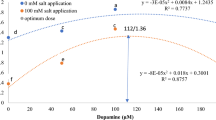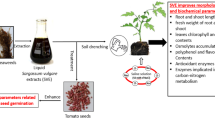Abstract
THE antibiotic chloramphenicol has been found to inhibit accumulation of salt by slices of red beet tissue and carrot tissue without significantly affecting respiration1. This supports the hypothesis that the mechanism of salt uptake is closely related to protein synthesis put forward by Steward and Millar2, as chloramphenicol is a specific inhibitor of protein synthesis.
Similar content being viewed by others
References
Sutcliffe, J. F., Nature, 188, 94 (1960).
Steward, F. C., and Millar, F. K., Symp. Soc. Exp. Bot., 8, 367 (1954).
Stout, P. R., and Arnon, D. I., Amer. J. Bot., 26, 144 (1939).
Bowling, D. J. F., and Weatherley, P. E. (in preparation).
Author information
Authors and Affiliations
Rights and permissions
About this article
Cite this article
BOWLING, D. Effect of Chloramphenicol on the Uptake of Salts and Water by Intact Castor Oil Plants. Nature 200, 284–285 (1963). https://doi.org/10.1038/200284b0
Issue Date:
DOI: https://doi.org/10.1038/200284b0
- Springer Nature Limited





